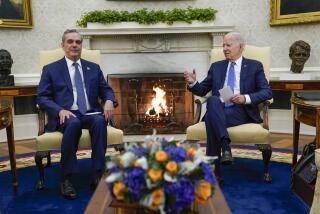Clinton Presses for Freer Trade
WASHINGTON — President Clinton launched a public campaign Friday to press Congress to give him the tools he needs to build freer trade relationships with Latin American and Asian nations, stressing that America does not “need to be afraid of foreign trade.”
The president called on Congress to grant him authority to negotiate trade pacts that cannot be amended in the House or Senate, warning that the nation’s competitive standing in world markets is at stake.
“Last year, for the first time ever, Latin American nations had more trade with Europe than the United States,” Clinton said in a luncheon speech to the American Society of Newspaper Editors. “There is no reason to think other nations will wait while we sit idle.”
Clinton wants to extend the North American Free Trade Agreement, which facilitates free-flowing trade with Canada and Mexico, first to Chile and then later to much of the rest of the Western Hemisphere. His administration also is striving to open markets in Asia.
Clinton also pressed Congress to ratify an international treaty banning chemical weapons. Failing to do so, he said, would “send a direct signal of retreat to the rest of the world.”
Both issues, Clinton said, represent critical tests of how the United States intends to exercise its influence as the world’s only remaining superpower.
Clinton also warned that reverting to an isolationist position would cost America dearly, eroding its economy and its lead position in the world.
Clinton’s rhetoric was aimed at prodding a reluctant Congress to provide him with “fast-track” authority to negotiate a broad array of new trade agreements. This authority would require Congress to vote quickly--without amendments--on international trade agreements reached by the administration.
Clinton stressed that Congress has given this authority to every president since 1974. But the authority expired in 1993, and Clinton faces an uphill battle trying to persuade Congress to renew it.
Congress has resisted in large part because the president favored including a provision requiring trading partners to safeguard worker rights and the environment as part of any new trade agreements and Republicans do not want to give him that broad a mandate.
More to Read
Sign up for Essential California
The most important California stories and recommendations in your inbox every morning.
You may occasionally receive promotional content from the Los Angeles Times.










